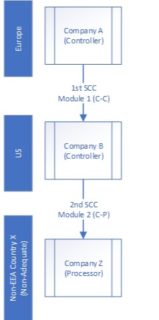Companies are allowed to transfer personal data outside the European Economic Area (EEA) if they are (1) transferring data to an entity that is within a country that has been recognized by the European Commission as ensuring an adequate level of protection or (2) they have put in place a European Commission-approved mechanism (a “safeguard”) that imposes many of the substantive provisions found within the GDPR.1
The United States is not currently recognized as an “adequate” country. As a result, controllers in the EEA are typically required to utilize a safeguard when transferring personal information to the United States. The most common safeguard utilized is referred to as the “Standard Contractual Clauses,” or “SCCs” – a template contract that was approved by the European Commission in June of 2021.2 The SCCs are actually comprised of four different “modules,” which are intended to be used (separately or in unison) to account for the following different types of transfers:
|
Module |
Exporter |
Importer |
|
Module 1 |
Controller |
Controller |
|
Module 2 |
Controller |
Processor |
|
Module 3 |
Processor |
Processor |
|
Module 4 |
Processor |
Controller |
Despite the fact that the SCCs are designed to be used with relatively little customization (i.e., the material terms of the SCCs cannot be modified without jeopardizing their status as an approved safeguard), significant confusion exists as to when certain modules of the SCC should be utilized, and what types of transfers are permitted. The following provides a visual summary of how a controller in the United States that receives personal data from a controller in the EEA can onward transfer the personal data, using the SCCs, to a processor that is located in a different non-adequate country.
|
Visual |
Implications |
|
|
|
[1] Companies are also permitted to transfer personal data outside of the EEA if the transfer is subject to one of the exceptions or “derogations” found within Article 49 of the GDPR.
[2] These are sometimes referred to as the “new SCCs” to distinguish them from the “old SCCs” – previous templates that were approved by the European Commission under the Privacy Directive, and that can no longer be utilized as an approved transfer mechanism in new contracts.





 />i
/>i



